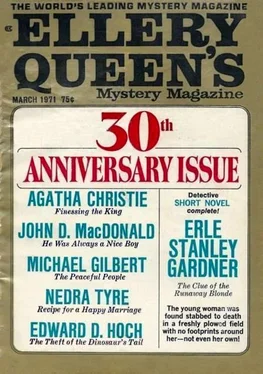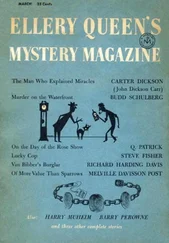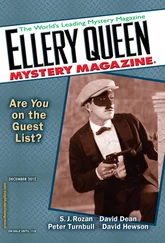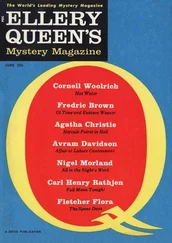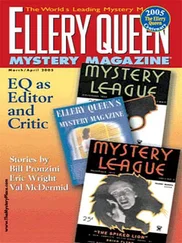Jon Breen - Ellery Queen’s Mystery Magazine, Vol. 57, No. 3. Whole No. 328, March 1971
Здесь есть возможность читать онлайн «Jon Breen - Ellery Queen’s Mystery Magazine, Vol. 57, No. 3. Whole No. 328, March 1971» весь текст электронной книги совершенно бесплатно (целиком полную версию без сокращений). В некоторых случаях можно слушать аудио, скачать через торрент в формате fb2 и присутствует краткое содержание. Город: New York, Год выпуска: 1971, Издательство: Davis Publications, Жанр: Классический детектив, на английском языке. Описание произведения, (предисловие) а так же отзывы посетителей доступны на портале библиотеки ЛибКат.
- Название:Ellery Queen’s Mystery Magazine, Vol. 57, No. 3. Whole No. 328, March 1971
- Автор:
- Издательство:Davis Publications
- Жанр:
- Год:1971
- Город:New York
- ISBN:нет данных
- Рейтинг книги:3 / 5. Голосов: 1
-
Избранное:Добавить в избранное
- Отзывы:
-
Ваша оценка:
- 60
- 1
- 2
- 3
- 4
- 5
Ellery Queen’s Mystery Magazine, Vol. 57, No. 3. Whole No. 328, March 1971: краткое содержание, описание и аннотация
Предлагаем к чтению аннотацию, описание, краткое содержание или предисловие (зависит от того, что написал сам автор книги «Ellery Queen’s Mystery Magazine, Vol. 57, No. 3. Whole No. 328, March 1971»). Если вы не нашли необходимую информацию о книге — напишите в комментариях, мы постараемся отыскать её.
Ellery Queen’s Mystery Magazine, Vol. 57, No. 3. Whole No. 328, March 1971 — читать онлайн бесплатно полную книгу (весь текст) целиком
Ниже представлен текст книги, разбитый по страницам. Система сохранения места последней прочитанной страницы, позволяет с удобством читать онлайн бесплатно книгу «Ellery Queen’s Mystery Magazine, Vol. 57, No. 3. Whole No. 328, March 1971», без необходимости каждый раз заново искать на чём Вы остановились. Поставьте закладку, и сможете в любой момент перейти на страницу, на которой закончили чтение.
Интервал:
Закладка:
Mr. Calder came to see Mr. Fortescue on the third day.
He said, “What Lewis told us has checked. I still don’t know how the money gets into this country from France, but as soon as it does get here it’s taken to a betting shop in Covent Garden. The Action Committee meets in the back room of a pub just down the road. It’s on their instructions that the cash payments are handed out from the bookmakers. That’s as much as I’ve been able to learn. I can’t get any closer to these people. Some of them know me.”
Mr. Fortescue considered the matter, rotating a silver pencil slowly over in his hand as he did so. Then he said, “If you’ve evidence that stolen money is passing through this betting shop there should be no difficulty about getting permission to listen in to their telephone.”
“You ought to get some useful tips on the races,” said Mr. Calder.
Mr. Fortescue did not smile. His eyes were on his pencil. “Some sort of arrangements must be made for the reception of the money.”
“That probably takes place after the shop’s shut. There’s a back entrance.”
“No doubt. What I mean is, they must know when to expect the money and who’s going to bring it. If we could find that out, we could put our finger on the courier. Then we might be able to backtrack to the person who brings it across the Channel. We shall have to do it very carefully.”
“You will indeed,” said Mr. Calder. “These boys have got eyes in the back of their heads.”
It was exactly a week later when Mr. Fortescue called on the Home Secretary and made his report.
“When you gave us permission to listen in to that betting shop we started to make some real progress. It was the calls after hours that interested us. They were very guarded and came through different intermediaries, but we were able to trace them to their original source.”
“To the carrier of the money?”
“To his house.”
“Excellent. Who is the man?”
“The owner of the house,” said Mr. Fortescue with a completely impassive face, “is Sir James Docherty.”
For a moment this failed to register. Then the Home Secretary swung round, his face going red. “If that’s a joke—” he said.
“It’s not a joke. It’s a fact. The point of origin of these messages is Sir James’s house in Eaton Terrace. Sir James also happens to be a member — a founding member — of The Peaceful People. Taken alone, I agree, neither of these facts is conclusive.”
“Taken together they’re still inconclusive. You told me that The Peaceful People were backing their Action Committee with money. The messages might have been about that.”
“They might have been,” said Mr. Fortescue, “but they weren’t. They had nothing to do with the official business of the Society at all. And here are two other facts. One of my men has been making inquiries in Paris. He has established that there is a regular courier service between the Chinese Trade Commission and the Hotel Continental. Which happens to be Sir James’s regular pied-a-terre in Paris. Add to that the fact that Sir James’s visits are usually arranged at official level. And that this enables him to bring in his valise, which is said to carry official papers, under diplomatic exemption.”
The Home Secretary said, “Do you really believe, Fortescue, that a man in Sir James’s position would lend himself to smuggling currency — a criminal maneuver?”
“Whether or not I believed it,” said Mr. Fortescue, “would depend in the last analysis on my estimate of his character.”
The Home Secretary turned this reply over in his mind for a few moments. Then he grunted and said, “He’s a loud-mouthed brute, I agree. And I loathe his politics. But that doesn’t make him a crook.”
“I am told that he is something of a domestic tyrant. I would not assert that he beats his wife, but she certainly goes in considerable awe of him. His only son, Robin, has been forced to study political science and is dragged round at his father’s chariot wheels, no doubt destined to be turned into a junior model.”
“And that’s our next Foreign Secretary. A fascist with a taste for gunboat diplomacy. What do you want to do? Tap his outgoing Calls?”
“Yes. And have his mail opened. And have him watched day and night, in England and in France. If he’s our man he’ll slip up, sooner or later, and we’ve got to be there to catch him when he falls.”
“If he’s our man,” said the Home Secretary. “And if he isn’t, by any chance, and if he finds out what we’re doing — there’ll be an explosion which will rock Whitehall from end to end.”
“So I should imagine.”
“The first head that will roll will be mine. But make no mistake about it, Fortescue. The second will be yours.”
The young Customs Officer at Heathrow Airport produced a printed form and said, “You know the regulations, sir?”
“Since I have traveled backwards and forwards to Paris some twelve times this year,” said Sir James Docherty, “I think you may assume that I have a nodding acquaintance with the regulations.”
“And have you made any purchases while you were abroad?”
“None whatever.”
“Or acquired any currency?”
Sir James looked up sharply and said, “I don’t acquire currency when I travel. I spend it.”
“I see, sir. Then would you mind opening this valise?”
“I would mind very much.”
“I’m afraid you must, sir.”
“Perhaps you would be good enough to examine the seal on the lock. I take it you are capable of recognizing an Embassy Seal?”
“Yes, sir.”
“And perhaps you would also read this note from our Ambassador, requesting you to confer the customary exemption from search on this bag which, I might add, contains important diplomatic documents.”
The Customs Officer glanced at the letter, then handed it to the thick-set man in a raincoat who was standing beside the counter. This man said, “I’m afraid, sir, that I have an order here, signed by the Home Secretary, overriding the Ambassador’s request.”
“And who the hell are you?”
“My name’s Calder.”
“Then let me tell you, Mr. Calder—”
“I think we ought to finish this in private.”
Sir James started to say that he was damned if he would, realized that he was shouting and that people were starting to look at him, and resumed his public-relations manner.
“If you wish to continue this farce,” he said in a choked voice, “by all means let us do it in private.”
“But it wasn’t a farce,” said Mr. Calder. “There were three thousand pounds, in fivers, stowed away flat, at the bottom of his valise.”
“What explanation did he give?”
“He was past rational explanation. He screamed a bit and stamped and foamed at the mouth. Literally, I thought he was having some sort of fit.”
“But no explanation?”
“I gathered, in the end, that he said someone must have been tampering with his baggage. Frame up. Police State. Gestapo. That sort of line.”
“I see,” said Mr. Fortescue. He said it so flatly that it made Mr. Calder look up.
“Is something wrong, sir?”
“I gather,” said Fortescue, “that Sir James has managed to persuade our masters that we have made a very grave mistake.”
“But good God! I saw the notes. We all did. How does he suggest they got there?”
“He suggests,” said Mr. Fortescue sadly, “that Behrens put them there. I am seeing the Home Secretary in an hour’s time. I rather fear that we may be in for trouble.”
“Incredible though it may seem,” said the Home Secretary, “it really does appear that the one person who couldn’t have put the money there was Sir James himself — unless he bribed half the Ambassador’s private staff.”
Читать дальшеИнтервал:
Закладка:
Похожие книги на «Ellery Queen’s Mystery Magazine, Vol. 57, No. 3. Whole No. 328, March 1971»
Представляем Вашему вниманию похожие книги на «Ellery Queen’s Mystery Magazine, Vol. 57, No. 3. Whole No. 328, March 1971» списком для выбора. Мы отобрали схожую по названию и смыслу литературу в надежде предоставить читателям больше вариантов отыскать новые, интересные, ещё непрочитанные произведения.
Обсуждение, отзывы о книге «Ellery Queen’s Mystery Magazine, Vol. 57, No. 3. Whole No. 328, March 1971» и просто собственные мнения читателей. Оставьте ваши комментарии, напишите, что Вы думаете о произведении, его смысле или главных героях. Укажите что конкретно понравилось, а что нет, и почему Вы так считаете.
